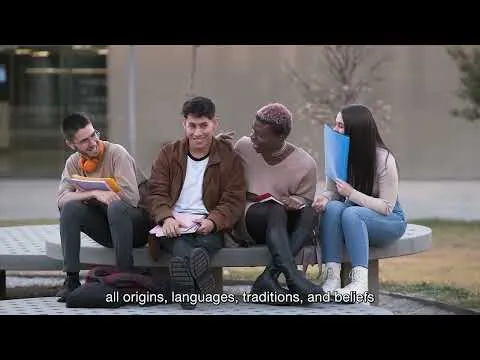Equal Opportunities and Belonging
Every day Bocconi endeavors to build a university that is truly reflective of the society in which we want to live. It continues to be an increasingly diverse and inclusive institution — a physical and virtual space that is both safe and welcoming for all.
Ensuring that members of its community — regardless of gender, gender identity, religion, nationality, ethnicity, socioeconomic background, sexual orientation, disability or mental health needs — feel both seen and heard remains a crucial objective of the University.
Everybody In, Nobody Out

Multiculturalism
The university campus is located in Milan, an international and innovative metropolis — a place where languages, experiences, ideas and interests are exchanged on a daily basis, fostering both professional and personal growth.
Bocconi embraces cultural diversity by fostering an inclusive environment where individuals from different backgrounds feel valued through ongoing dialogue that acknowledges and responds to their unique experiences and needs.
Multicultural Classes: Multicultural classes are a key resource for students since they encourage the exchange of experiences and ideas, and present an important source of inspiration for faculty. However, they are also incredibly complex to navigate. This is why “Diversity and Inclusion in Teaching” was created — a training course created for faculty that, among other topics, addresses the management of multicultural classes, providing practical solutions for situations that might occur in the classroom.
Bocconi Alumni Community: The Bocconi Alumni Community allows its over 146,000 members (graduates of Bachelor, Master, Specialized Master and PhD programs, as well as SDA program graduates, who live and work in various countries) — located in numerous chapters around the world — to keep in touch and stay engaged with Bocconi. The Community organizes events and themed seminars, and also offers Career Advice services.
Multifaith Space: A multifaith space is located on campus, open to the entire student body, faculty and staff. It was designed to permit anyone to practice their faith, pray or simply devote a moment to reflection and silence.
Ethical-Religious Meals: The offering of halal, kosher and vegan meals in dining areas underscores Bocconi's commitment to recognizing and supporting the dietary needs of the entire community — which may be related to religious, ethical and/or cultural beliefs.
Student Associations: As of today, there are more than 100 student associations on campus, including ones representing various international communities. The associations offer an opportunity to engage with people from different backgrounds who share common interests, thus becoming a point of reference and mutual support.
Gender Diversity
The University is committed to fostering a welcoming and inclusive environment for everyone, regardless of gender, gender identity and sexual orientation.
Additionally, Bocconi recognizes the importance of gender equality as a core value for an equitable and respectful academic community by tracking gender representation within the University and taking actions to raise awareness and achieve parity.
Inclusive Gender Equality Plan
The Inclusive Gender Equality Plan (IGEP) 2025–2027 is a three-year strategy that reflects on the present while outlining future initiatives to promote equal opportunities at the University and in academia.
Gender Report
The Gender Report analyzes gender equality trends over time using various indicators, while also outlining activities aimed at promoting gender equality, equal opportunities, and the wellbeing of all university members.
Gender Equality Policy
This document outlines Bocconi University’s commitment to gender equality, defining principles and objectives for an inclusive, fair and respectful environment, in line with the Strategic Plan 2026–2030. It represents a key tool for obtaining the Gender Equality Certification (UNI/PdR 125:2022).
Bocconi Carriera Alias (Identity Regulation)
The Alias identity is an alternative and temporary bureaucratic profile that replaces the registry name of a person going through a gender reassignment process with a chosen name.
To ensure comfort for non-binary, transgender and all individuals, Bocconi has established all gender restrooms in every building alongside restrooms already available at the University.
Disabilities and Specific Learning Disorders (SLDs)
The University provides support and access for people with disabilities and/or specific learning disorders in its community, making efforts to guarantee equal opportunities through accessible infrastructure, assistive technologies, and other specialized services.
Students can receive support during their university career, including: personalized measures for the admission test, lectures and exams; accessible accommodation; and digitized materials. Additionally, they can receive personalized assistance regarding exchange programs and career guidance.
The objective is to encourage a participatory experience, fostering the full realization of each individual’s potential.
Dedicated services are available for both prospective students and current students.
Accessibility
Physical Accessibility and Dedicated Services
Accessibility of campus spaces is guaranteed for all students, faculty, staff and visitors. The University has installed elevator platforms, wheelchair ramps, and automated doors, and has also constructed accessible classrooms with built-in or additional desks.
For people with blindness or low vision, the following services can be found on campus: radio beacons (signal transmitters placed outside buildings and along connecting paths); Braille maps of the campus; and Braille plaques outside classrooms, offices and bathrooms. Other services available to all members of the community include:
- access for service animals
- home-university transportation
- a mobility companion service between buildings
-
public and private parking spaces for people with disabilities
Digital Accessibility
Bocconi promotes a just, inclusive and accessible digital environment for its entire community by voluntarily adhering to current digital accessibility standards, including Law 4/2004 and AgID guidelines for accessibility of IT tools. The University works hard to continuously modernize and improve its digital content, as demonstrated by the accessibility statement. In order to stay informed of new technologies and standards in digital accessibility, Bocconi has partnered with a digital accessibility expert.
Health and Wellbeing
The physical and mental wellbeing of members of the Bocconi community (students, faculty and staff) is a priority for the University. The University promotes a healthy lifestyle, offering specific resources dedicated to balancing both physical and mental health through one's professional and academic path.
Available initiatives include:
- wellbeing activities
- counseling service
- on-campus safety and security
- counseling helpdesk for core faculty and staff (ISSIM)